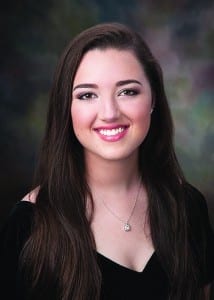
Ashley Diaz is Westminster Christian School’s Silver Knight nominee in Science. She likes science so much she started Westminster’s chapter of the Science National Honor Society.
“Freshman year I was talking to my science teacher,” she says. “Why isn’t there a Science Honor Society? Can I start one?”
She says SNHS gives science students community service opportunities. One of the projects SNHS members sponsor is Puppies on the Grass.
“We bring puppies from different shelters to campus during mid-terms and finals week,” Diaz says. “It’s stress relief for the students and the puppies are up for adoptions. It’s a win-win. We’ve had more than 10 adoptions in two-and-a-half years.”
Ten or eleven puppies are brought in at a time from different shelters across Miami.
“We have a pen set up,” she says. “The students can go and pet the puppies. And we have a booth and they can adopt the puppies there.”
Information about Puppies on the Grass is posted on social media, so students and their parents know when the puppies will be at the school. If a student wants to adopt a puppy, their parents have to come to do the paperwork and a home visit is scheduled.
Diaz also started is the mangrove reclamation project.
“We collect mangrove propagules,” she says. “Mangroves can’t grow correctly. We take them to campus to grow correctly. We go out to Virginia Key and Key Biscayne to plant them properly.”
The first year, they collected and grew 350 propagules. This year, they collected between 400 and 500.
“We actually go with our science teachers,” she says. “We go on kayaks.”
The propagules are collected in October and planted in April. Science club members also work at the Westminster Science Fair program.
“We assign SNHS members to specific elementary school students,” she says. “They work as a mentor. They build a quantitative science project. The children get to learn about the science education from the high school students. It strengthens the science program.”
Diaz is known for her strong science fair projects. She did one in behavioral psychology that took her from the South Florida Regional Science Fair to the Florida State Science Engineering Fair. She got second place for three years in a row.
“Last year I went to the Intel International Science and Engineering Fair using the behavioral psychology project,” she says. “I tested the dynamics of cheating in the lives of high school and college students. I found that even though 90 percent of students say that cheating is morally wrong, 84 percent cheat on a regular basis.”
She says cheating consists of anything that didn’t come from your own mind.
“If you looked up an answer, looked on someone else’s paper, hacked the test database,” she says. “I thought it was pretty alarming. I talked to a lot of professors and neuroscientists. They said it is a big problem in college right now.”
Diaz says she thinks students cheat because of the high pressure to get into college on scholarships. This past summer, Diaz interned at the University of Miami Spinal Cord Research Institute through a program at the Howard Hughes Medical Institute.
“I worked in the laboratory,” she says. “Under Damien Pierce, studying spinal cord injuries. I did research on enzymes.”
In college, Diaz wants to study neuroscience and behavior and eventually go into medicine.
“I don’t know if I’d be an MD, but maybe I’d go into research,” she says.
She’s applied to Vanderbilt, Columbia, the University of Pennsylvania, Washington University and Georgetown.
Linda Rodriguez Bernfeld






